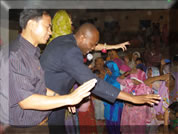
| |
| HOME |
| SEEKING GOD |
| UNITING in CHRIST |
| AFFILIATES PAGES |
| MAKING DISCIPLES |
| EQUIPPING MINISTRY |
| MOBILIZING in CHRIST |
| BIBLES |
| ONLINE LIBRARY |
| LINKS |
| CONTACT US |
| SITE MAP |
Jesus' life:
|
POLICIES & PROCEDURESPOSITION STATEMENT ON SEXUALITY |
||||||||||||
This
position Statement should be read in conjunction with our Sexual
Abuse Policy which outlines Renewal Ministries
Fellowship's definition of and response to abusive sexual behaviours.
There have been considerable changes in what is considered to be acceptable expressions of sexuality in western society over the last few decades. In Australia the proportion of couples who cohabit before (or instead of) marriage increased from 15.6% in 1976 to 56.3% in 1992 (ABS, 1993a:8). In 1988 Kurdek wrote that the attitudes of the community to homosexuality are negative but gradually becoming relatively more positive, particularly for males. Allgeier and Allgeier (1991) estimated that in the USA 3-5% of adult women and 6-10% of adult men were homosexuals while about 2% of men and women reported to Smith (1990) having a homosexual experience in the previous 12 months. On 28th July, 2004 the American Psychological Association issued a press release supporting legalisation of same-sex civil marriages (Willenz, 2004). In the light of these social changes and the very different pressures they put on individuals and families it is important for the church to clearly portray our understanding of God’s perspective on these issues that so greatly impact on people's lives. God, as our creator and redeemer, teaches us through His Word (the Bible) how we were designed to live in relationship with Him and others. The nature of our sexual activity is far from being the central theme in the Bible and should not become the central theme in our churches - the central theme is redemption throgh Jesus Christ which is offered to all without exception. The Bible, however, does deal with this issue that can so affect human lives and thus we need also to deal with it in the light of scripture. Our understanding of God's desire for humankind begins with the account of our creation: So God created man in His own image, in the image of God He created him; male and female He created them (Gen.1:27). For this reason a man will leave his father and mother and be united to his wife, and they will become one flesh. The man and his wife were both naked, and they felt no shame (Gen.2:24,25). In the perfection of original creation, before sin entered the world, the man and woman flawlessly complemented each other, were united together as husband and wife, and lived in total openness without shame. Genesis 3 describes 'the fall' which distorted our character, relationship with God and with each other. The rest of scripture records God's dealing with the consequences of that fall and the various ways He has been calling us back to right relationship with Himself, others, the created universe and ourselves. Every aspect of our lives is touched on in God's prescription for our wholeness and many examples given of how the great, and not so great, failed to live in accord with His ways (sinned) and reaped the consequences of that sin. In the area of our sexuality the whole thrust of scripture makes it clear that God created us as sexual beings and designed that sexuality to be expressed and fulfilled within the covenant of marriage between a man and a woman. Sexual acts outside that covenant of marriage are denounced (eg. rape, incest, adultery, promiscuity, homosexuality, bestiality, oppression, pagan worship, child sacrifice in Lev 18:22-20:13; sexual immorality, adultery, prostitution and homosexuality in 1Cor. 9-20; adulterers and perverts in 1 Timothy 1:10). Positive affirmation is given to the relationship between a husband and a wife (Genesis 2:24,25; 1 Cor.7:2-5; 1 Tim. 3:1-13) to the extent of likening it to the relationship between Christ and His church (Ephesians 5:22-33). Positive affirmation is also given to choosing a life of chaste singleness (1 Cor. 7:1,7-9, 25-28, 32-35, 37-38). There is no such positive affirmation given in scripture for sexual relationships outside the covenant of marriage between a man and a woman. The position of Renewal Ministries Fellowship is, therefore, that all sexual relationships outside the covenant of marriage between a man and a woman are sin and contrary to God's purpose for our lives. This in no way judges or condemns those who may feel a desire for such relationships - Jesus has been tempted in every way, just as we are -yet was without sin. Let us then approach the throne of grace with confidence, so that we may receive mercy and find grace to help us in our time of need (Heb. 4:15b-16). No temptation has seized you except that which is common to man. And God is faithful; He will also provide a way out so that you can stand up under it. (1Cor. 10:13) Finally: because He himself suffered when He was tempted, he is able to help those who are being tempted (Heb. 2:18). The vital question that arises out of this position is how are we to treat those who sin sexually? In answering this let us first examine how Jesus treated those He came in contact with who were identified as sinning sexually:
From Jesus' actions we can conclude that those who are repentant, or hurting and wounded, or accused and condemned in their sexual sin are to be treated with grace, love and respect. Jesus never shied away from exposing the person's sin in their private conversation with Him but neither did He allow them to be judged and condemned by the self-righteous crowd nor to be defined by their sin. In Romans 1:18-32 Paul describes a very different type of sinner (including sexual sinners) - the powerful, proud, self-righteous sinners who exalt themselves above God. They suppress the truth by their wickedness... neither glorified Him as God nor gave thanks to Him... claimed to be wise... exchanged the truth of God for a lie, and worshiped and served created things rather than the Creator... they did not think it worthwhile to retain the knowledge of God... although they know God’s righteous decree that those who do such things deserve death, they not only continue to do these very things but also approve of those who practice them. These proud, self-righteous sinners Paul treats in a similar way to how Jesus treated the proud, self-righteous Pharisees – exposing and condemning their heart attitudes and ungodly actions. Again in 1 Cor. 5:1-13 Paul is dealing with a proud, self-righteous attitude towards sexual sin and so is swift to expose and pass judgment on it: expel the wicked man from among you - but not in order to destroy the sinner, rather that he see the reality of his actions, repent and be restored. In 2 Cor. 2:4-11 Paul is just as quick to urge total forgiveness, comfort and reaffirmation of their love for the sexual sinner who had now repented. (Interestingly, unlike the Pharisees, Paul confronted the sin of the man and did not blame it on the woman). So, should we fellowship with and make welcome in our churches those who practice sexual sin? Do we fellowship with and make welcome in our churches those who practice other sins, or are sinners excluded from our churches? James writes: We all stumble in many ways (James 3:2a). Jude 22-23 urges us to: Be merciful to those who doubt; snatch others from the fire and save them; to others show mercy, mixed with fear – hating even the clothing stained by corrupted flesh. The purpose of all our interactions with others, including those caught in sexual sins, should be redemption - the ministry of reconciliation: We are therefore Christ's ambassadors, as though God were making His appeal through us. We implore you on Christ's behalf: Be reconciled to God. God made Him who had no sin to be sin (ie a sin offering) for us, so that in Him we might become the righteousness of God. There may be occasions where proud, self-righteous sinners who encourage others to join in their sin and refuse to acknowledge God’s righteous decrees need to be excluded from our fellowship to provide them with an opportunity to see the consequences of their sin and come to repentance, to protect the rest of the congregation, and to honour God. Others who are struggling and desiring to honour God may more properly be embraced, loved, encouraged and enfolded in grace, providing the atmosphere for God to do the work of transformation in their lives. Brothers, if someone is caught in a sin, you who are spiritual should restore him gently. But watch yourself, or you also may be tempted. Carry each other's burdens, and in this way you will fulfil the law of Christ. (Gal. 6:1-2) Next comes the question of leadership positions within the church. James 3:1 warns Not many of you should presume to be teachers, my brothers, because you know that we who teach will be judged more strictly. This matches with Paul's description of the character traits and lifestyle that must be evident in those appointed to leadership positions in the church (1Tim. 3:1-13). A lifestyle of sexual sin precludes one from leadership positions within the church, as does a lifestyle of drunkenness, greed, gossip or violence (including domestic violence). Do you not know that the wicked will not inherit the kingdom of God? Do not be deceived: Neither the sexually immoral nor idolaters nor adulterers nor male prostitutes nor homosexual offenders nor thieves nor the greedy nor drunkards nor slanderers nor swindlers will inherit the kingdom of God. And that is what some of you were. But you were washed, you were sanctified, you were justified in the name of the Lord Jesus Christ and by the Spirit of our God. 'Everything is permissible for me' - but not everything is beneficial. 'Everything is permissible for me' - but I will not be mastered by anything. 'Food for the stomach and the stomach for food' - but God will destroy them both. The body is not meant for sexual immorality, but for the Lord, and the Lord for the body. By His power God raised the Lord from the dead, and he will raise us also. Do you not know that your bodies are members of Christ himself? Shall I then take the members of Christ and unite them with a prostitute? Never! Do you not know that he who unites himself with a prostitute is one with her in body? For it is said, 'The two shall become one flesh' But he who unites himself with the Lord is one with Him in spirit. Flee from sexual immorality. All other sins a man commits are outside his body, but he who sins sexually sins against his own body. Do you not know that your body is the temple of the Holy Spirit, who is in you, whom you have received from God? YOU ARE NOT YOUR OWN; YOU WERE BOUGHT WITH A PRICE. THEREFORE HONOUR GOD WITH YOUR BODY. (1 Cor. 6:9-20) In Western societies that exalt sexual expression to a basic human right choosing the path of celibacy, whether because one has not yet found a suitable person of the opposite sex to marry or because one is attracted to persons of the same sex and not those of the opposite sex, can be looked down upon as repressed or deprived but being a slave to cultural expectations or even our own lusts and desires is not the freedom that Christ has called us too. Paul wrote: But indeed I also count all things loss for the excellence of the knowledge of Christ Jesus my Lord, for whom I have suffered the loss of all things, and count them as rubish, that I may gain Christ and be found in Him ... that I may know Him and the power of His resurrection, and the fellowship of His sufferings, being conformed to His death (Phil. 3:8-10). There are many aspects of our fallen nature that can master us and rob us of the beauty that God created us to be. Some of us struggle in one area and some another. Yet the overwhelming testimony of scripture is the promise of freedom in Christ Jesus. It is for freedom that Christ has set us free. Stand firm then and do not let yourselves be burdened again by a yoke of slavery (Gal. 5:1). We were washed, we were sanctified, we were justified in the name of the Lord Jesus Christ and by the Spirit of our God. You, my brothers, were called to be free. But do not use your freedom to indulge the sinful nature; rather, serve one another in love. So I say, live by the Spirit, and you will not gratify the desires of the sinful nature. For the sinful nature desires what is contrary to the Spirit, and the Spirit what is contrary to the sinful nature. They are in conflict with each other, so that you do not do what you want... Those who belong to Christ Jesus have crucified the sinful nature with its passions and desires. Since we live by the spirit, let us keep in step with the Spirit (Gal. 5:13, 16-18, 24-25). Although at times the struggle may seem overwhelming as crucifying our sinful nature and self-centeredness is not an easy nor comfortable process (everything within our flesh resists such - Rom. 7:15-25) there is available to all of us in Christ: freedom from condemnation (Rom. 8:1), healing, restoration, renewal and the freedom to honour God with our body. The good news of the Gospel is:
ABS (1993a) Australia's Families: Selected Findings from the Survey of Families in Australia 1992, Canberra: Commonwealth Government Printer. Allgeier, E. and Allgeier, A.R. (1991) Sexual Interaction, 3rd, Lexington, MA: D.C. Health. Kurdek, L.A. (1988a) Correlates of negative attitudes toward homosexuals and heterosexual college students. Sex Roles, 18, pp727-38. The Holy Bible: New International Version. (1984). Michigan: Zondervan Publishing House. Smith, T.W. (1990) Adult sexual behaviour in 1989: number of partners, frequency and risk. Paper presented at the Meeting of the American Association for the Advancement of Science, New Orleans, LA. All scripture references excerpted from Compton's Interactive Bible NIV. Copyright (c) 1994, 1995, 1996 SoftKey Multimedia Inc. All Rights Reserved.
|
||||||||||||
Renewal -Rebirth, Regeneration, Restoration, Rekindling, Revitalisation, Replenishment & Revival. Exalting Jesus - Restoring, Equipping, Releasing & Supporting People...
Uniting, Discipling, Equipping & Mobilizing the Body of Christ
|
loved them..." (John 17:23)



